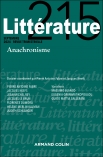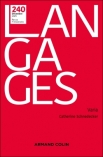
LITTÉRATURE Nº213 (1/2024)
Pour acheter ce numéro, contactez-nous
Recevez les numéros de l'année en cours et accédez à l'intégralité des articles en ligne.
De l’épistémè romantique allemande de la totalité, Balzac a retenu l’ambition de connaissance sensible et la méthode de déclinaison organisée, encyclopédique, des objets matériels pour proposer, par le roman, une représentation complète de la société humaine qui subsume toutes les causalités. Plus que trope, la métonymie est figure de pensée et la description découvre le moment de la pensivité active dans le texte. Mais la pensée balzacienne de la totalité trouve la vérité de son ambition dans l’inachèvement et la fragmentation de son ensemble, dans le refus d’une totalité du tout.
Balzac retains from the German romantic episteme of totality the ambition for empirical knowledge and the method of an organised, encyclopaedic declension of material objects in order to put forward, through the novel, a complete representation of human society subsuming all causalities. More than a trope, metonymy is a figure of thinking itself and description reveals the moment of active thoughtfulness within the text. But the Balzacian thought of totality finds the truth of its ambition in the incomplete or fragmented nature of its whole, in the refusal of a totality of the whole.

